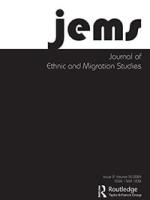Treading water in transit
EU containment and Tunisian domestic policies have produced a new, Black migrant, urban underclass. Based on in-depth ethnographic fieldwork among Ivorian migrant women in Bhar Lazreg, a Tunis banlieue, this paper explores how the women navigate and negotiate everyday life. On the urban margins of society, forgotten and far from the border, migrants reinvent ways to keep moving. The paper suggests that their stuckness is still all about movement as encapsulated in the emic term bouger – akin to treading water, involving a constant motion to stay afloat, but without ever getting anywhere. Tension operates across many levels, between the physical, the temporal–spatial, and the existential. Embedded in this tension is a second emic term prison à ciel ouvert (open-air prison). Juxtaposing a space that feels carceral and limiting while simultaneously bursting with potential for movement, the paper contributes to the literature on immobility within mobility. But beyond that, the empirical findings show a far more complex reality, complicating the notion of transit. By exploring the tensions and entanglements between the emic terms it becomes clear that to understand spaces of transit it is essential to understand stuckness and movement as fundamentally intertwined, overlapping, and co-constitutive.
DIIS Experts


